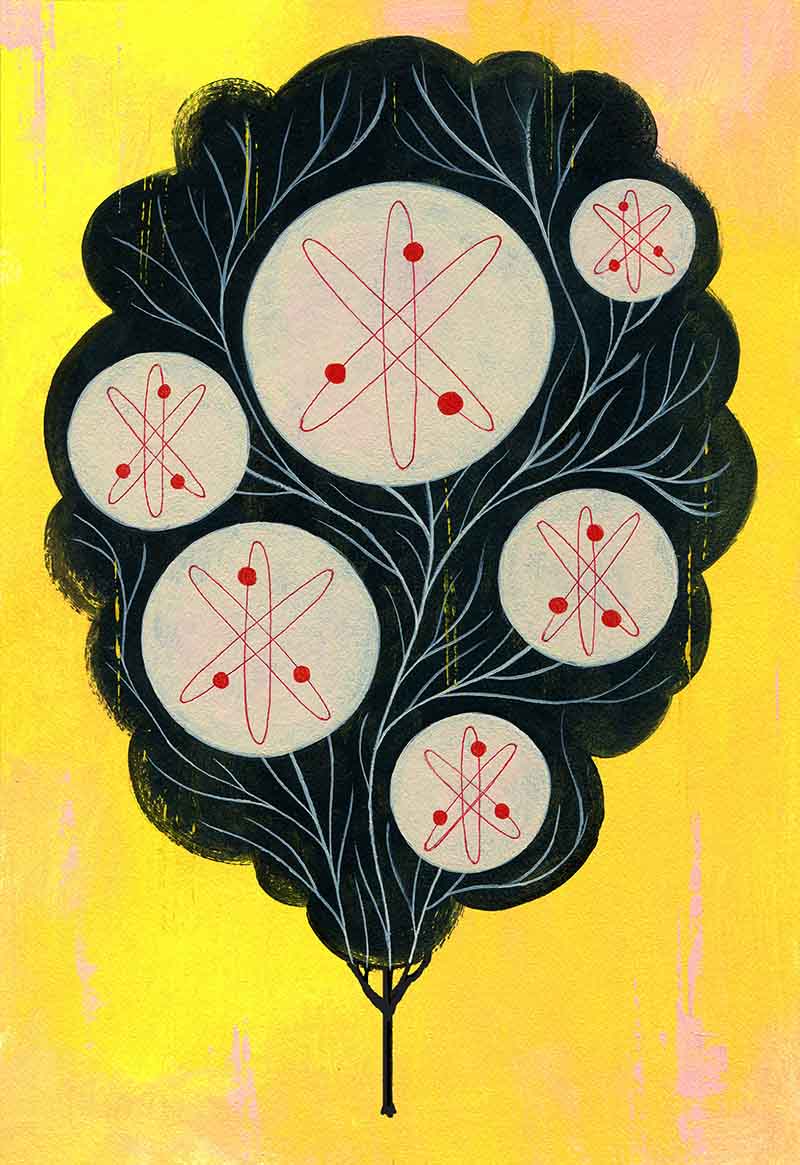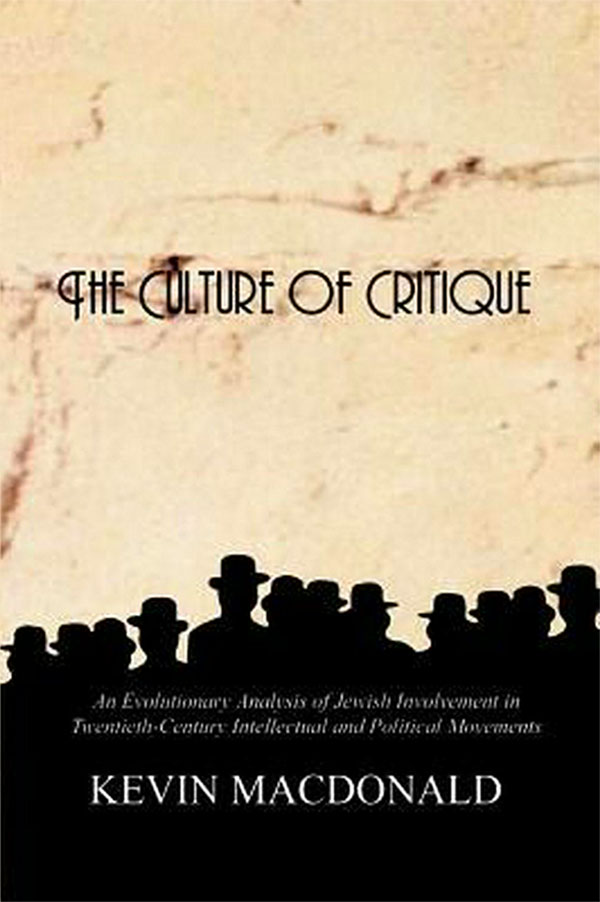In the 20 years since the publication of his best-known book, “The Culture of Critique,” Kevin MacDonald, an emeritus professor of psychology at California State University, Long Beach, has complained that his work receives scant attention from academics — though there are reasons for the silence. The book, after all, has much in common with centuries-old anti-Semitic conspiracy theories, and, using the language of evolutionary psychology, MacDonald infamously argues that many Jews oppose the values of Western civilization in order to pursue insular group interests.

MATTERS OF FACT:
Exploring the culture of science.
MacDonald complains, for example, of “a Jewish-dominated elite” that “has emerged to dominate intellectual and political debate,” even as it “almost instinctively loathes the traditional institutions of European-American culture.”
“Indeed, intense hatred of perceived enemies appears to be an important psychological characteristic of Jews,” MacDonald writes.
Since the book’s publication in 1998, MacDonald has openly aligned himself with white nationalists, including former Ku Klux Klan leader David Duke, and testified on behalf of the Holocaust denier David Irving. More recently, MacDonald’s work has become popular among the ascendant alt-right. The Daily Stormer, a white nationalist blog, sometimes refers to him affectionately as “K-Mac.”
With a few exceptions, though, mainstream evolutionary psychologists have long ignored MacDonald’s work — that is, until this year. In March, the journal Human Nature published a pointed but respectful rebuttal of the theories postulated in “The Culture of Critique.” Then, in early June, a full-throated defense of MacDonald’s work appeared in Evolutionary Psychological Science, a mainstream, peer-reviewed journal published by Springer Nature.
That paper, titled “Jewish Group Evolutionary Strategy Is the Most Plausible Hypothesis,” largely repeats MacDonald’s arguments. It claims that Jews have evolved to pursue strategies that “promote Jewish interests in the West,” and that Jews may be biologically wired to be more ethnocentric than other people.
As experts have pointed out, these arguments evoke a long history of anti-Semitic rhetoric. But more than that, they raise troubling questions in an era of shifting norms with regard to race, politics, and even science. Does bigoted academic work like MacDonald’s warrant a fair rebuttal, for example? Or does even a respectful critique have the effect of legitimizing it as part of mainstream discourse? After 20 years, why is Kevin MacDonald suddenly finding defenders in academia? And finally, why are ostensibly respectable, peer-reviewed journals — including one that counts intellectual luminaries like Harvard’s Steven Pinker and neuroscientist Sam Harris on its board — now publishing lavish defenses of what has been dismissed for decades as anti-Semitic pseudoscience?
As it turns out, the author of the criticism of MacDonald’s work, Nathan Cofnas, travels in the same intellectual circles as Edward Dutton, who wrote the pro-MacDonald response. The two men met a few years ago at the London Conference on Intelligence, an annual gathering where attendees reportedly talk about contentious (and largely disproven) topics like eugenics, IQ, and the biology of racial difference.
Both men also have ties to the Ulster Institute for Social Research, a small British think-tank that publishes reports on racial differences, human evolution, and IQ. The organization is run by Richard Lynn, a controversial scholar popular among those who argue that black people are inherently less intelligent than white people. Cofnas published a book with the Ulster Institute in 2012, which he has since withdrawn from publication — hoping, he says, to preserve it for inclusion in future work. Dutton told me that he receives funding from the Institute, where he is an affiliated scholar.
In an interview with Undark, Cofnas said that he first became interested in MacDonald’s work as a teenager, but that an academic mentor had discouraged him from writing about it. MacDonald’s work has seemingly grown more popular with the rise of the alt-right, and Cofnas, who is pursuing a Ph.D. in the philosophy of biology at Oxford, felt that it was time to respond. “The establishment clearly rejected MacDonald’s ideas and said he doesn’t represent evolutionary psychology, and all that. But why didn’t they just point out what’s so wrong about it?” Cofnas told me. “He’s not on the radar of most mainstream thinkers. But he is very influential.”
Alt-right figures like Richard Spencer, Cofnas continued, admire MacDonald’s work. Cofnas claims that some evolutionary psychologists do, too — albeit in secret, because the ideas are so charged.
“A response was definitely warranted,” he said.
In his 21-page long response to MacDonald’s work, Cofnas argues that the theorist misuses sources, applies his theory differently to Jews and non-Jews, and chooses a complicated explanation for Jewish history when simpler ones would suffice. Cofnas wasn’t sure that a journal would even accept a rebuttal of MacDonald’s work, but the first journal he submitted a draft to, Human Nature, took the paper.

Kevin MacDonald’s 1998 book “The Culture of Critique.” “When I evaluate Jews,” he told me, “I try to see if they’re Jewishly-motivated.”
When we spoke, I asked Cofnas whether he was concerned that responding to MacDonald would legitimize his ideas. Why not say that the guy has a long track record of anti-Semitism, seems to be repeating old tropes, and leave it at that? “There’s nothing wrong, in my opinion, in principle, with trying to understand why any group behaves the way it does,” Cofnas said.
“I don’t think certain questions should be put off limits,” he continued, “because they remind us of a history that we don’t like. But it’s not necessary to dismiss MacDonald for that reason, because I think there are straightforward scientific reasons to reject him.”
The audience for his rebuttal was substantial. Scientific papers rarely get more than a few hundred downloads, but Cofnas’ paper was downloaded more than 30,000 times in the first two weeks it was online. Today, it has been downloaded more than 50,000 times. Jane Lancaster, an emeritus anthropologist at the University of New Mexico and the editor of Human Nature, told me she had no idea Cofnas’ paper would get this kind of response. She wasn’t previously aware of MacDonald’s popularity on the alt-right, she said, and she did not realize that people outside the field were so interested in Jewish cultural evolution. “I was astonished,” she said, adding that the paper got as many downloads in a month “as we are likely to get for all manuscripts for the year.”
Was she worried that Cofnas’ paper, by taking MacDonald seriously, would legitimize his argument?
That concern, Lancaster said, didn’t even come up.
“If it had come up, I wouldn’t buy that argument,” she added. “Not responding doesn’t make it go away.”
Lancaster told me that Edward Dutton had submitted his response to Cofnas — the paper that defends MacDonald — to Human Nature as well. It was “unsubstantiated as a critique” she said, and she rejected it. Instead, Dutton’s paper quickly found a home in Evolutionary Psychological Science. That journal was founded in 2014, and a number of prominent figures sit on its editorial board — including Pinker, the Harvard cognitive psychologist and bestselling author; Harris, the neuroscientist and moral philosopher; and University of Texas evolutionary psychologist David Buss.
For his part, Dutton — who lectures at the University of Oulu in Finland — is not trained as a scientist. His Ph.D. is in religious studies, but he has a longstanding interest, he said, in evolution, and he recently cowrote a book with Richard Lynn about “evolution and racial differences in sporting ability.” His papers about IQ and religious belief have also been widely cited in the media.
When we spoke by Skype earlier this month, Dutton paused the conversation at one point to ask me where I came from. I told him that I didn’t quite understand the question. “Are you from Iran?” he asked. I explained that I was from Tennessee. “Your background — you look like you’re Iranian, or something like that.” When I asked him why the topic was relevant, he changed the subject.
At the end of the interview, Dutton raised the issue of ancestry again. “The reason I asked what your background was is because I infer from your surname that you’re probably Jewish,” he said, adding that he did not understand why I was covering this topic for Undark.
When not inquiring about my ancestry, Dutton said that he was initially skeptical of MacDonald’s work, but that he ultimately decided that his core principles might be sound. In a paper published in 2016, Dutton and a colleague analyzed survey data of four American religious groups — Baptists, Catholics, Methodists, and Jews — talking about their group identity. This may seem like flimsy evidence on which to base a grand theory of Jewish history, but from this and other studies, Dutton concluded that Jews may be inherently more ethnocentric than other groups. And, he told me, if Jews are “congenitally more ethnocentric,” then “it is a reasonable hypothesis that if they are overrepresented in intellectual movements which are for the good of the Jews, that would be, or in some way it could be argued that part of that is probably an ethnocentric strategy.”
In the paper, and in our conversation, Dutton echoed MacDonald’s argument that Jews, for hidden ethnic reasons, gravitate toward intellectual movements like multiculturalism or feminism. These are movements, Dutton argues, that undermine white ethnic solidarity in the West. “That’s what I think is going on with the high representation of Jews in ideologies which specifically question Western traditions, and therefore make the West less ethnocentric,” he told me. “Undermine the structures which make the West ethnocentric — things like religion, things like sexual boundaries, that kind of thing.”
I asked Dutton what he made of the contention that MacDonald comes to conclusions that mirror longstanding anti-Semitic theories.
“There’s nothing you can do about it,” Dutton replied. “Not everything that was thought in the past was wrong.”
Todd Shackelford, an evolutionary psychologist at Oakland University in Michigan and the founding editor of Evolutionary Psychological Science, describes Dutton’s paper as “risky.” But, he says, that made it a good fit for the journal. “I want this to be a journal where you do see riskier stuff. Stuff more on the edge. Stuff that’s taking more of a chance,” Shackelford told me.
Shackelford said that he didn’t agree with everything in Dutton’s paper, and, in a follow-up email, stressed that he has “serious reservations about Dutton’s arguments.” But he saw it as a serious response to Cofnas’ dissection of MacDonald. “I thought Dutton did a very nice job of saying, ‘hold on here, maybe we’ve thrown the baby out with the bathwater,’” Shackelford said.
Shackelford reports rejecting between 75 and 80 percent of submissions, but the Dutton paper made the cut. Cofnas was one of the two anonymous peer reviewers, and both recommended it for publication.
Of course, not all scholars in the field of evolutionary psychology are quite so eager to address MacDonald’s theories. Asked for expert comment on Dutton’s paper, Robert Boyd, an anthropologist at Arizona State University and a senior figure in the field, responded that he wouldn’t touch the topic with a 10-foot pole. “This topic is totally toxic,” he wrote in an email. “There’s no possibility of doing good science. The data are poor, people have very strong priors, and the issues are so charged that every discussion becomes instantly moralized.”
After receiving a request for comment from Undark, Steven Pinker indicated that he had not read the Dutton paper. Upon doing so, he sent a note to Shackelford, the journal’s editor, expressing his disappointment with the decision to publish it. “I’d be the first to acknowledge that politically controversial ideas should not be censored from scientific journals if they are supported by rigorous theory and data,” Pinker told Undark in an email. “But both MacDonald’s theory and Dutton’s defense of it are extraordinarily weak.”
(In an email to Undark after receiving Pinker’s letter, Shackelford noted that the journal plans to publish a response from Cofnas. “In hindsight, I would have liked to have delayed the online appearance of Dutton’s paper so that it could be published simultaneously with Cofnas’ response,” he wrote).
MacDonald’s theory, Pinker argued in his email to me, “is not derivable from the foundational ideas of evolutionary psychology.” But his arguments “do resemble, point for point, venerable anti-Semitic tropes, with every proposition being invidious to Jews rather than described in scientifically neutral language.” Pinker also questioned how Dutton’s paper added anything to the field. “I have never before seen an article in a scientific journal whose purpose is to establish a theory’s ‘plausibility,’ an inherently subjective judgment,” Pinker told me. “Worse, the article fails to make the case even for plausibility, trotting out one ad hoc excuse after another for the obvious counterexamples to MacDonald’s claims.”
Aryeh Tuchman, associate director of the Anti-Defamation League’s Center on Extremism, has been tracking MacDonald’s work for years. “I was struck by the way in which MacDonald incorporates age-old anti-Semitic tropes,” he said.
“I was like, ‘Oh my gosh,” he continued, “I’ve studied this in graduate school, I’ve written papers about this, and now here’s a guy who’s actually doing it, in the wild, so to speak, and presenting it as science rather than simply an anti-Semitic gloss or portrayal of historical events or historical phenomena.’”
Tuchman is concerned about the effect of renewed interest in MacDonald’s ideas.
“Now that we’ve had two articles in an academic journal, everyone is going to feel like they need to weigh in,” he said. “That’s really unfortunate. These ideas are best left on David Duke’s podcast, and not in an academic journal.”
In my conversation with Shackelford, the journal editor, he argued that it was important to debate controversial ideas openly. “We need to be careful about writing something off because it upsets us,” he told me.
“If MacDonald is wrong,” he said, “let’s see why he’s wrong.”
Of course, there are many ideas — some with passionate followings — that don’t receive much attention in academic journals. These might include flat-earth theory, for example, or the belief in unicorns, or the theory that the federal government stages school shootings. To debate a theory like MacDonald’s is both to legitimize it and to tacitly accept some of its premises — namely, that there’s such a thing as a distinct, subtle “Jewish agenda” or “Jewish psychology” that exists in tension with white European society.
That idea, as Pinker, Tuchman, and others point out, is not radical or new. It’s perhaps the single most influential anti-Semitic concept of the past few centuries.
But that’s the real bind here — one that confronts not just scientists, but journalists and other citizens in an era of rising white nationalism. Are bad ideas permitted to flourish when we simply ignore them? Or is it the debate — the open back-and-forth and public rebuttals — that actually gives them oxygen and legitimacy?
Along these lines, I debated whether or not to call MacDonald himself for this essay. He’s not hard to find: For all his claims to intellectual exile, he retained his tenured position at California State Long Beach for years — though the university’s faculty has taken steps to distance themselves from him. In the end, I decided to call and ask what he made of seeing his work debated in academic journals in 2018. “It’s great that, after 20 years, the book is finally getting some attention,” MacDonald told me.
“I was very surprised to see that [paper] published in Evolutionary Psychological Science,” he added, saying that he was “quite happy” with the result.
In his paper, Cofnas argues that MacDonald applies a double-standard to Jews and non-Jews in his work, constantly hypothesizing and investigating ethnic motives for the actions of Jews, and assuming other kinds of motives for everyone else. MacDonald seemed unsure how to respond when I asked him about this charge. “I don’t know — when I evaluate Jews, I try to see if they’re Jewishly-motivated,” he said, adding: “You can’t find Jewish motives with non-Jews.”
True enough. And therein, of course, lies the unconquerable, circular logic: If Jews are Jewishly-motivated, then anything Jews do can be chalked up to Jewish motives.
MacDonald did pen his own, lengthy response to Cofnas — 17,000 words — which appeared on his ResearchGate page and at The Unz Review, a blogging platform that hosts many alt-right authors. He ends his rebuttal by suggesting that Cofnas, who is Jewish, may have had more than scientific and intellectual rigor in mind when challenging the elder academic’s theories.
“I do think,” MacDonald told me, “there’s an ethnic motive.”
Michael Schulson is an American freelance writer covering science, religion, technology, and ethics. His work has been published by Pacific Standard magazine, Aeon, New York magazine, and The Washington Post, among other outlets, and he writes the Matters of Fact and Tracker columns for Undark.











Comments are automatically closed one year after article publication. Archived comments are below.
Dutton’s article is so painfully shallow andnot surprisingly the docent of anthropology at Oulu University has no training in either biology or psychology. His background is in theology yet he peppers a paper with terms like GFP and group selection, along with multiple assertions which have no data or argument to back them and gets published in ‘Evolutionary Psychological Science’.
“It’s remarkable how much intelligence can be invested in ignorance when the need for illusion is great”
Wow, so many rabid racist responses. Just check your Ancestry dot com DNA results. A good number of American Jews are actually European. How many of us have African ancestry we didn’t know about before.
It turns out that Dutton’s suspicion of the author of this article being Jewish was spot on:
“As a young Jew…” – Michael Schulson
https://sojo.net/articles/why-evangelicals-love-jews-case-unrequited-love
And so even though the author of this extremely biased hit piece tried to portray ethnocentric Jewish deception and subversion of White Gentiles as a thoroughly debunked conspiracy theory, all of the dishonest and deceptive critics of MacDonald’s work that he cited (Cofnas, Pinker, Tuchmanm, and the author himself) are Jewish – which substantiates MacDonald’s argument perfectly.
It seems that you Jews are mostly banking on the masses being too lazy to read MacDonald’s work, Cofnas’ extremely weak critique, and MacDonald’s convincing defense of his work.
Within the next 100 years, it will become clear to most people that the Jewsish people are the descendants of Greeks and Macedonians of Alexander’s armies, and that the Hebrew Bible is largely based on Greek history and philosophy. At that time it will be impossible to argue any kind of “racial”differences between “European” and “Jews.”
Maybe then we can start destroying the idea that skin pigmentation also divides us into so-called races.
Anyone who does business, law, or charity work with Jews will tell you they act as a tribe in competition with everyone else and hate when that’s pointed out. The excuse they were forced to loan money in the middle ages doesn’t exactly hold water 1,000 yers later when Goldman Sachs exploits working class and middle class Americans. Maybe they should join the world community and they would be treated better.
It’s like always: to prove that the Jews are the blameless scapegoats of history, one way or another. Attached to this world, everything “just” happened to them. With this premise an infinite onthological problem is created, for us all!
One day the Jewish mindset will come to understand that everything that happened to them was of there own making, breaking the mould of that very mindset itself.
Schulson, the author-journalist of this piece, certainly failed to provide many of the facts or arguments contained in the
underlying papers (the book and critiques both for and against) about which he is reporting. Yet the commentator-critics here, either knowingly or ignorantly, fail to understand that the article is about the academic handling of and controversy surrounding McDonald’s “Culture of Critique” (“Critique”). In short, the article is about the academic environment surrounding this particular “science,” not about the actual notions in Critique.
However, in reviewing the comments section, one can easily see that the critics herein are not interested in the science of Critique either, as none of them have presented any citations to that work or the articles both against and for. While not all on the “alt-right” are neo-Nazis, those commenting above are. The references to Jews and their ethno-centrism are pure racism. MacDonald’s idea, that Jews penetrate a Western society and then destroy it from within in order to improve their own ethnic group’s power, at the expense of that society at large, is a Nazi idea in modern times (with a long historical pedigree) and is made laughable (especially in the case of the United States) with even a cursory knowledge of history. American dominance in science and technology can, in almost every case, be traced directly back to Jews. American dominance of nuclear weapons and energy can be traced to Einstein and Oppenheimer and a dozen other Jews. A cursory glance at the Nobel Prizes given (to Americans) for scientific discovery is a Who’s Who of (American) Scientific Jewry. Wall Street’s dominance of international business, commerce and finance, which has brought uncountable riches to America is a tale of Jewish ascendancy. The architect of King Dollar was a Jew, and his disciples (at the Federal Reserve) have kept the Dollar the world’s reserve currency ever since. Technology, i.e. applied science, is a mostly Jewish affair: Apple (Wozniack), Facebook (Zuckerberg), Google (Brin) and I could go on for days. And, also, the “American Dream”(tm) was wholly minted in Jew-dominated “Hollywood.” American culture was crafted (Levi’s jeans) and presented (Metro-Goldwyn-Mayer Studios) to the world by Jews. In short, Jews made America the dominant military, economic and cultural power of the 20th and 21st (so far) centuries. Before that, it was Jewish capital that financed both Great Britain’s empire and Prussian economic ascendancy. Yet, MacDonald and his ilk spend their lives tracking down a few irrelevant Jewish atheists and feminists and claiming that these nobodies tear down America’s (Jew-driven) might. Please, racists, choose another group to focus your froth upon. Jewish accomplishment is too well documented. Oh, and for the one critic suggesting Jews should be more deferential to those “letting them in” to America — we arrived on the same boat you did. Unless you were a Native American practicing Stone- and Bronze-age culture and technology, I think your comment is pure, unadulterated irony.
How does critiquing a dissertation in and of itself legitimize it? I suggest that it only gains legitimacy if it successfully stands up to it’s critics. This being so it seems to me that this argument or assertion puts the cart before the horse in that it starts from the untested premise that it’s illegitimate. It seems to be a clever ploy to censor unwanted content.
The first misrepresentation comes early: “…contentious (and largely disproven) topics like eugenics, IQ, and the biology of racial difference.”. “Disproven”, by whom? The word is “unfashionable”.
Your smears don’t appear to be working anymore. Labeling something “anti-semitic” doesn’t mean it is, but even if it is (according to you), it doesn’t mean the work is not accurate. Dr. MacDonald’s books were given a peer review by his fellow academic Dr. Frank Salter (also, not a Jew) and Dr. Salter endorsed Dr. MacDonald’s books as good research. Dr. MacDonald’s complaint was not that other scientists criticized his works. He wanted criticism, but something should not be criticized without being read, and under hostile Jewish power, other academics would not read his books. Have you?
After all the problems Jews have had over the centuries, they continue to alienate the peoples of the countries that invited them to their countries and now it appears to be happening in the USA. The disgusting laws that Jews have enacted in Europe to jail anyone that criticizes them are not in place here yet, although Jews are pushing for them. This will only make things worse if Jews continue to exercise their power in such a hostile way, until they are eventually stripped of their abusive power.
You smear the great historian David Irving too. Mr. Irving’s research and many bestselling books have received enthusiastic endorsements by fellow leading historians and the mainstream media. It was only when organized Jewry organized a worldwide campaign to defame him and destroy his career that the extreme hostility to Mr. Irving began. The Jews actually had West Point and other military academies remove Mr. Irving’s books from their teaching curriculums. That is how good his books are and that is how hard they work to cover up the truth.
After Mr.Irving made a major discovery in Soviet archives that would answer many questions about WW II, Josef Goebbels many years of diaries, Jews bullied the publisher of Mr. Irving’s book on the diaries into refusing to publish the book that they had already submitted for awards. Here is one of them on TV arguing to censor the book.
Why did you write this article if you’re just going to misrepresent the facts?
You label people, strawman their views, and dismiss entire fields of science in parenthetical asides. Why anyone would even bother to engage in this hitpiece respectfully is beyond me. This article is either libel or gross negligence on the part of the “journalist,” the editor, and the publisher.
There are no scientists now nor in the past who have ever argued that all members of an ethnic group share a trait in common. The blurred lines of color and ethnicity obfuscate, in a rigorous context, what is colloquially understood as racial categories. The conversation has moved beyond this yellow journalism of debunk by mere suggestion. If you want data and can understand statistics, your time is better spend using critical thought to read the facts and debunk them yourself.
This piece will do you no favors, offers no substantial rebuttal, and is in truth just the author’s obligated signal of allegiance.
If you think this comment is hypocritical, you understand the meta point I intended to make.
Unlikely. However, I am going to say with 100% certainty that you have one.
Definitely an ethnic motive with Cofnas and Pinker